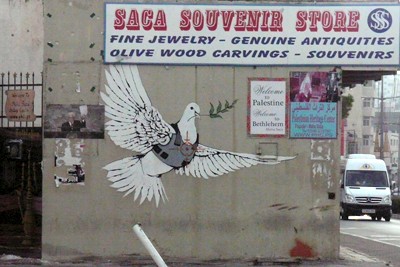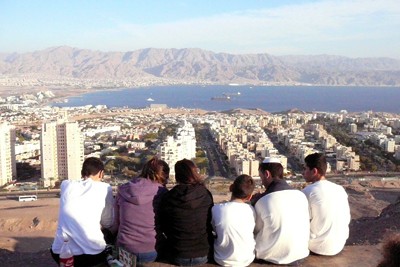Cornell Perspectives: Leuenberger on war for beginners
By Christine Leuenberger
Leuenberger, senior lecturer in the Department of Science and Technology Studies, was conducting research in Israel and the West Bank as a National Science Foundation Scholar Nov. 15, 2012, when bombs began to fall on Tel Aviv. That war between Israel and Hamas in Gaza lasted from Nov. 14-21.
"Is it your first war?" Ofer* asked. "Yes," I said. He laughed knowingly. I asked him, "Have you been in a war before?" "Yes, in 1991," he replied.
Tel Aviv suddenly had a special and intimate atmosphere. The sound of the first red alarm there since 1991 produced a social cohesion that was different from everyday life. My usually grumpy neighbors invited me to stay with them at any time. Like southern Israelis who frequently evacuate to the homes of northern relatives to escape the barrage of missiles, I was invited to Haifa and Jerusalem to stay indefinitely to escape "the bombing of Tel Aviv." Yet, I did not take up these offers. While from abroad, the war appeared extraordinarily alarming and all encompassing, in Tel Aviv it was almost business as usual, except for the occasional sounds of sirens.
After the first siren violently punctured what is known as the "Tel Aviv bubble," a favored nickname for the city that never sleeps and seems far removed from the Israeli-Palestinian conflict, the most pressing question for days was, "Where were you when the siren sounded?" But after the second alarm, war novices like myself quickly learned what to do when the siren sounded. Gathering in windowless staircases, bomb shelters and safe rooms, hovering in open spaces in brace position -- covering head and neck in one's arms -- or lying on the ground became part of everyday life.
In true Tel Aviv spirit, one man allegedly inquired at a public bomb shelter whether they served espresso. A war veteran, who had lived through the 1967 and 1973 wars, recounted that upon hearing the alarm he just goes out and smokes a cigarette. Ohev, a work-obsessed academic, explained that "missile time" is a good time to get work done. Aaron also pointed out that "the likelihood of a missile landing on your head is very small compared to having a car accident." He laughed, "You would have to have very bad karma for that to happen to you." And Ayelet told me that Israel comes out of wars with few casualties.
But she also told me that the fear, terror and psychological scarring that people experience is a story that remains untold. Her grandchildren in Israel's south have learned to differentiate between the sound of incoming missiles and the boom of the anti-missile defense system hitting its target. They also have learned that, once a rocket is launched from Gaza, they have 15 seconds to run to a shelter. Daniel informed me, "Here in Tel Aviv we have up to 90 seconds." This, he says, "is paradise."
Changing odds
In the West Bank city of Ramallah, I met Badra. She stared absent-mindedly into space. All her family was in Gaza. She told me that a lot of them lived together in one house. They have no safe rooms. When the bombing starts, the electricity goes out. They go to the first floor with candles, but when the fighter jets rumble overhead the candles go out. When jets hit their target, the earth shakes and the windows shatter. There, the likelihood of a rocket landing on your head is less due to "bad karma" than to the possibility of becoming collateral damage in a small, densely populated area. There, only a wink and a prayer will do: "We will not be hit this time, inshalla (God willing)!" Indeed, she tells me that everyone knows someone who experienced a loss.
While at its narrowest point the distance between the West Bank and Gaza is just 40 kilometers, in Ramallah it was more or less business as usual. For locals, Ramallah is also a "bubble" as it has attracted numerous international NGOs, and its many cappuccino bars cater to the Palestinian elite. While people were upset about the unfolding war in Gaza, "they had seen it all before."
Yet amid growing reports of Palestinian demonstrations in various hot spots, a security officer warned me that in other parts of the West Bank things were getting "pretty hot." Israeli soldiers had repopulated abandoned checkpoints (there are 522 Israeli-controlled obstacles including roadblocks and checkpoints inside the West Bank), checking cars, trucks and pedestrians; that did not endear them to the locals. To them, the influx of ever more young soldiers with high testosterone and heavy machine guns embodied yet again the worst stereotypes of "typical Israelis." I was informed that given the extent of the Israeli infrastructure inside the West Bank, the Israeli military could close down the West Bank and all its checkpoints in five minutes. For West Bank Palestinians it was another reminder of their lack of territorial sovereignty. However, while Tel Aviv's hot air was frequently pierced by the red alarm, Ramallah seemed nevertheless like a respite from war; it was quiet, and life seemed to have a normality that was absent in Israeli areas within a 75-kilometer radius from Gaza.
Fear without borders
Moving between the bubbles of Tel Aviv and Ramallah, I talked to the young Israeli mother who was terrified for the safety of her newborn, and the Palestinian grandmother who described the war as nothing but terror. When I told people on one side about the suffering on the other, my words all too frequently were met with stunned silence and callous indifference. Certainly, as Elijah pointed out, "If missiles are flying at you, you are not going to hug your enemy."
Indeed, others on the other side all too often become dehumanized. They become embodied, visualized and incorporated into the missiles that they send over the border. When I pointed out to an Israeli student that medical facilities in Gaza were not equipped to deal with the causalities coming in, he vehemently retorted, "I don't care. They started it." When I told a young Palestinian woman about Israelis' sense of siege and psychological terror that comes with being exposed to missile attacks, she shrugged, "Well, isn't that the goal? They want to scare Israelis." Borders have historically had the effect of increasing social cohesion on the inside and a sense of social differentiation toward people on the other side. And with border skirmishes as well as rockets being sent both ways, the border only becomes harder and the horizons narrower.
An American perspective
While many foreigners filled the departure halls of Ben Gurion Airport at the start of the war, those who stayed not only had to get their footing in a war zone, but also engage in a public relations campaign with family and friends abroad. Influenced by the Western media's appetite for "bad news from Israel," those back home tended to assume that everyone in Israel and Palestine was equally at risk. Trying to persuade them otherwise seemed like a losing battle against the many sensational images of war flickering across America's TV screens.
There is a geography of war, and one quickly learns to differentiate between safer and riskier places. The theaters of war are often very localized, so much so that my French neighbor told me that in Tel Aviv, "This is not war, but it is unpleasant."
Yet on the day we were all anticipating a long-awaited ceasefire I received an email asking: "Are you OK? I heard about the bus bombing in Tel Aviv!" This particular bombing seemed to have suddenly elevated "unpleasant" to "terrifying." The war now had not only burst the Tel Aviv bubble, but had come to our doorstep.
Residual effects
How is one to navigate a place amidst the constant fear of being in the wrong place at the wrong time every day of the week? Yaakov explained that this was a novice's way of thinking about the consequences of low-scale warfare. One develops self-protective strategies, learns to identify what seem like safe places, avoids buses and large shopping malls and is mindful about which cafés to frequent. A sense of risk becomes part of the fabric of everyday life, just as one learns to live with the much greater risk of car accidents in the United States.
At the end of the war, Hamas proclaimed victory; the images of the bus bombing in Tel Aviv and of a damaged four-story house become its signifier. The Israeli government, too, pronounced victory as the campaign apparently greatly diminished Hamas' military capabilities, and Israel's new anti-missile defense system, "the Iron Dome," had become the war's hero.
As the sun set over Tel Aviv that evening, I walked along its beaches with Danny, a Lebanese war veteran. The clouds gathered in the distance. Suddenly there was thunder. He jumped in alarm. I asked him what he thought it was. "The war, of course," he said. His lips quivered and he looked into the distance, holding back tears. When I asked him whether many people feel this way, he told me, "They all do."
Now I, too, alongside so many Israelis and Palestinians, carry within me the memories of alarms and the sounds of warfare and the eerie feeling that peace is only the quiet between wars. The day after the war, the sun shone brilliantly and life seemed to click back into normal mode with unprecedented speed. Still, for a few days people asked each other, "Where were you during the war?" When I quizzed Orit a few weeks later, she looked at me, perplexed. "Which war?" she asked.
* All names have been changed.
Get Cornell news delivered right to your inbox.
Subscribe
